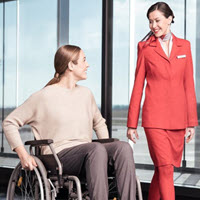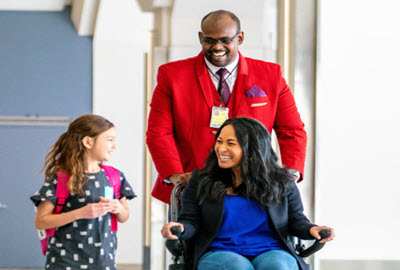 For travelers with disabilities, navigating airport disability services can be a daunting experience. The good news is that airports are more equipped to handle special needs than ever before. From wheelchair assistance to the Americans with Disabilities Act (ADA) and the Air Carrier Access Act (ACAA) protections for airline passengers, various options are available to make travel easier for those with disabilities. In this guide, we’ll cover everything you need to know about airport disability services and how to make the most of them.
For travelers with disabilities, navigating airport disability services can be a daunting experience. The good news is that airports are more equipped to handle special needs than ever before. From wheelchair assistance to the Americans with Disabilities Act (ADA) and the Air Carrier Access Act (ACAA) protections for airline passengers, various options are available to make travel easier for those with disabilities. In this guide, we’ll cover everything you need to know about airport disability services and how to make the most of them.
Wheelchair Assistance at US Airports
Travelling can be stressful, especially for individuals with disabilities. However, airports in the United States provide various services to ensure that all passengers have a smooth and comfortable experience. One of these services is wheelchair assistance. In this blog section, we will discuss everything you need to know about navigating airport disability services in the US with a focus on wheelchair assistance.
To ensure that you receive the necessary assistance during your trip, it is essential to make reservations as early as possible and advise the airline what type of assistance you will need. For instance, if you require wheelchair assistance or guided assistance, indicate that when making your reservation. If you cannot walk long distances, request an airport wheelchair when making your reservation. For travelers with battery-powered wheelchairs, it is important to arrive at the airport one hour before the normal check-in time.
It is also advisable to confirm your accessibility needs with all airlines involved in your journey. This step helps to ensure that all airlines are aware of your needs and can provide the necessary assistance.
When you arrive at the airport, you are required to self-identify to airline staff as a person with a disability needing this service. The staff will then provide you with prompt assistance. It is important to note that airlines are required to provide assistance in a timely fashion after you self-identify as an individual who needs assistance from airport personnel. Therefore, it is essential to arrive at the airport early enough to allow for sufficient time to receive assistance.
If you request wheelchair assistance with getting through the airport and the carrier believes you are misusing the service, the carrier may propose other assistance services to support your needs. For example, if you have difficulty walking long distances but can climb up and down stairs, you may be provided assistance to the gate by using a cart instead of a wheelchair. On the other hand, if you are blind or have low vision and need wayfinding assistance, you should be provided guide assistance and not wheelchair service.
If you are travelling with a motorised wheelchair, each airline will provide information on specific procedures for storing wheelchairs and wet-cell batteries. Additionally, airports have message boards located near flight display screens for persons who are deaf and hard of hearing. A 24-hour medical clinic is also available in the main terminal on the ground level in the garden court area. The clinic is accessible from the second level by various elevators.
"It's always wise to inform the airline of your requirements when booking your flight - a proactive approach to ensure a smooth and comfortable journey," assisted travel expert Roberto Castiglioni says. " "Although airports and airlines strive to cater to your every whim, pre-booking assistance is akin to securing a coveted reservation at a fine dining establishment. Sure, you may luck out and snag a last-minute spot, but why gamble on chance when you can savor the certainty of a stress-free journey?"
How Much Do You Tip For A Wheelchair At An Airport?
When it comes to navigating airport disability services in the US, one question that often arises is how much to tip for a wheelchair at an airport. While there is no set standard, a good rule of thumb is to tip at least $2 for the service, with additional tips for any extra assistance provided.
It's important to keep in mind that airport wheelchair assistants are often paid less than minimum wage, and tipping can make  the difference in their earnings. In fact, the average annual pay for an airport wheelchair assistant in the US is just over $26,000, or around $12.73 an hour.
the difference in their earnings. In fact, the average annual pay for an airport wheelchair assistant in the US is just over $26,000, or around $12.73 an hour.
While it may be tempting to assume that wheelchair assistance is a service provided by the airline and therefore not worth tipping for, it's important to remember that these workers are providing a valuable and necessary service. Many airports classify wheelchair aids as a tip-wage position, which means employers can legally pay them less than minimum wage.
If you're unsure of how much to tip, consider the amount of time the airport wheelchair assistant spends with you and the level of assistance they provide. For example, if they take you to the restroom or stop by the gift shop to pick up a book for your flight, you may want to consider tipping around $5.
It's also worth noting that wheelchair services at all airports in the US are complementary, so the cost is picked up by the airlines to ensure equal access for everyone. However, the attendants who provide this service still appreciate tipping.
When it comes to tipping for wheelchair services, the amount you tip ultimately depends on the level of service provided and your own budget. However, a small gesture of appreciation can go a long way in supporting these workers who provide an essential service to individuals with disabilities or mobility issues.
Is It Illegal To Get Wheelchair Assistance At An Airport If You're Not Disabled?
Air travel can be a stressful experience, especially for people with disabilities. Fortunately, airports and airlines in the United States offer disability services to make air travel more accessible. These services include wheelchair assistance, priority boarding, and other accommodations. However, there are still many misconceptions about these services, including whether it is legal to request wheelchair assistance if you are not disabled.
The Americans with Disabilities Act (ADA) and the Air Carrier Access Act (ACAA) are federal laws that prohibit discrimination against people with disabilities in all areas of public life, including transportation. These laws require airports and airlines to provide reasonable accommodations to people with disabilities, including wheelchair assistance. However, the ADA does not prohibit people who are not disabled from requesting wheelchair assistance.
It is important to note that while anyone can request wheelchair assistance, it is intended for people who have difficulty walking long distances or standing for extended periods of time. If you do not have a disability and request wheelchair assistance, you may be delaying the services for those who truly need them. Additionally, airlines may ask questions about your ability to perform certain air travel-related functions to ensure that wheelchair assistance is provided to those who need it most.
In conclusion, it is not illegal to request wheelchair assistance at an airport if you are not disabled. However, these services are intended for people with disabilities who have difficulty walking long distances or standing for extended periods of time.
"Although soliciting for wheelchair assistance despite not requiring it may not be a violation of the law, it certainly lacks moral integrity," Castiglioni says. " Your selfishness may cause some people who truly require the service to be left stranded."
How Is A Wheelchair Service International Passenger Processed When Arriving At USA Airport Customs Checks?
Wheelchair assistance is a service provided by the airport to help passengers with disabilities or mobility impairments navigate the airport. The service includes providing a wheelchair and an agent to assist the passenger throughout their journey, from check-in to boarding, and finally disembarking at their destination.
When a passenger arrives at the airport, they can request wheelchair assistance at the check-in counter or make a reservation in advance. Once the request is made, a trained agent will meet the passenger at the gate and provide assistance with luggage, transportation, customs, and baggage claim. The agent will ensure that the passenger has any necessary medications or medical supplies they may need.
After arriving at the airport, the wheelchair service agent will accompany the passenger through the customs process. The agent will help the passenger complete the required paperwork and answer any questions they may have. Once the customs process is completed, the agent will take the passenger to the baggage claim area, where they will help with retrieving bags and transferring them onto the wheelchair.
Experience a seamless arrival at your destination with ease by reserving wheelchair assistance in advance while booking your flight or by reaching out to the airline directly. This will ensure that an agent is available to assist you throughout your journey.
Airline Passengers with Disabilities Bill of Rights
Wheelchair assistance is a vital service that allows passengers with disabilities to navigate airports and board their flights safely and comfortably. The Airline Passengers with Disabilities Bill of Rights ensures that this assistance is provided free of charge and that airlines are trained to properly assist passengers with disabilities.
Under the Airline Passengers with Disabilities Bill of Rights, airlines are required to provide wheelchair assistance to passengers who need it, free of charge. This assistance includes assistance with boarding and deplaning, as well as assistance with baggage and security screening. Airlines are also required to provide accommodations for passengers with disabilities, including accessible restrooms, seating, and communication devices.
Additionally, the law requires airlines to provide training to their staff to ensure that they can properly assist passengers with disabilities. This training covers a wide range of topics, including how to assist passengers with mobility aids, how to communicate effectively with individuals who have hearing or vision impairments, and how to assist passengers with service animals.
Discover a treasure trove of valuable insights on the Airline Passengers with Disabilities Bill of Rights by visiting the Department for Transportation's website (click to open a new window).
 For travelers with disabilities, navigating airport disability services can be a daunting experience. The good news is that airports are more equipped to handle special needs than ever before. From wheelchair assistance to the Americans with Disabilities Act (ADA) and the Air Carrier Access Act (ACAA) protections for airline passengers, various options are available to make travel easier for those with disabilities. In this guide, we’ll cover everything you need to know about airport disability services and how to make the most of them.
For travelers with disabilities, navigating airport disability services can be a daunting experience. The good news is that airports are more equipped to handle special needs than ever before. From wheelchair assistance to the Americans with Disabilities Act (ADA) and the Air Carrier Access Act (ACAA) protections for airline passengers, various options are available to make travel easier for those with disabilities. In this guide, we’ll cover everything you need to know about airport disability services and how to make the most of them. the difference in their earnings. In fact, the average annual pay for an airport wheelchair assistant in the US is just over $26,000, or around $12.73 an hour.
the difference in their earnings. In fact, the average annual pay for an airport wheelchair assistant in the US is just over $26,000, or around $12.73 an hour.









